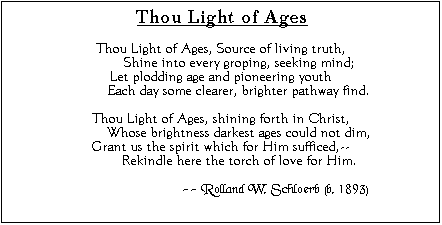

With this study, we continue our examination of the prologue of John's Gospel.
8He himself was not the light; he came only as a witness to the light. 9The true light that gives light to every man was coming into the world.
In the previous verses, the Apostle John (the writer of this Gospel) introduced to the reader John the Baptist, speaking of his mission: "There came a man who was sent from God; his name was John. He came as a witness to testify concerning that light, so that through him all men might believe" (vss. 6-7). Here, the Apostle John speaks of the relationship between John the Baptist and Christ: "He [John the Baptist] himself was not the light; he came only as a witness to the light. The true light that gives light to every man was coming into the world."
John the Baptist's faithfulness in his service to God had caused some of his followers to unduly exalt him. Early in his ministry, many thought he might be the Messiah: "The people were waiting expectantly and were all wondering in their hearts if John might possibly be the Christ" (Luke 3:15). John was always careful to dispel such expectations: "John answered them all, `I baptise you with water. But one more powerful than I will come, the thongs of whose sandals I am not worthy to untie. He will baptize you with the Holy Spirit and with fire'" (Luke 3:16). Surprisingly, even after Christ's death and resurrection, there were those who identified themselves with John the Baptist's ministry, but not with Christ's. In the book of Acts we are told of Paul's first meeting with the Ephesians: "There he found some disciples and asked them, `Did you receive the Holy Spirit when you believed?' They answered, `No, we have not even heard that there is a Holy Spirit.' So Paul asked, `Then what baptism did you receive?' `John's baptism,' they replied. Paul said, `John's baptism was a baptism of repentance. He told the people to believe in the one coming after him, that is, in Jesus.' On hearing this, they were baptized into the name of the Lord Jesus" (Acts 19:1-5).
Those who exalted John the Baptist, rather than Christ, misunderstood John's whole mission as the herald to prepare the way for the coming of the Lord (see Matt. 3:3). This misunderstanding was not the fault of John the Baptist. He was faithful in his mission. When given the opportunity, he always glorified Christ and humbled himself. For instance, when John's disciples complained that many of his disciples were starting to follow Christ, John replied: "He must become greater; I must become less" (John 3:30). John the Baptist would certainly agree with the Apostle John in our text: "He himself was not the light; he came only as a witness to the light."
Too often in Christianity, the messenger is glorified, many times due to the talents and gifts given them by the Holy Spirit. The dynamic speaker, the gifted teacher, the inspirational musician at times are exalted more than Christ. It is unwise, and unspiritual, to exalt any human. True servants of God will do their best to keep the focus on Christ. All glory, all honor, all exaltation must go to Christ.
So, as great a man of God as John the Baptist was, he was only a "witness to the light", with Christ being "the true light". As "the true light", "He is the centre and source of all spiritual light, warmth, life, health, growth, beauty, and fertility."[Footnote #1] Elsewhere, we Christians are called "the light of the world" (Matt. 5:14), but we are (just as the moon is for the true light of the sun) light-bearers for the true light of Christ, who is the source of whatever light we shine. We have no light in and of ourselves; and we had no light until the light of Christ shone on us. As Paul teaches: "For you were once darkness, but now you are light in the Lord" (Eph. 5:8).
Other commentators have noted four ways in which Christ is "the true light": "First, Christ is `the true light' as the Undeceiving Light. Satan himself, we read, `is transformed into an angel of light' (II Cor. 11:14), but he appears as such only to deceive. But Christ is the true light in contrast from all the other lights which are in the world. Second as `the true light' Christ is the Real Light. The real light in contrast from the dim and shaded light which was conveyed through the types and shadows of the Old Testament ritual. Third, as `the true light', Christ is the Underived Light: there are lesser lights which are borrowed and reflected as the moon from the sun, but Christ's `light' is His own essential and underived glory. Fourth, as `the true light', Christ is the Supereminent Light, in contrast from all that is ordinary and common."[Footnote #2]
"The true light" is also a universal light, that "gives light to every man" (vs. 9). This statement can be taken in a few different ways, all of which are true. First, the light of Christ is available to all races of men, not just the Jews. Second, the light of Christ shows no favoritism; it shines on the poor as well as the rich, the simple as well as the wise, the weak as well as the strong. Third, the light of Christ is given to every man through the light of conscience and reason, "so that men are without excuse" (Rom. 1:20). Indeed, the fact that "the true light...gives light to every man" places responsibility upon every man to respond to the light. Yes, you can ignore the light, though it shines on you. You can pull down the shades, hide in a cave, or bandage your eyes, to escape the light, but then your lack of light would be your fault, not due in any way to the weakness of the light. And sadly, many do their best to hide from the light. Christ tells us the reason that they do so: "This is the verdict: Light has come into the world, but men loved darkness instead of light because their deeds were evil. Everyone who does evil hates the light, and will not come into the light for fear that his deeds will be exposed" (John 3:19-20).
Indeed, Christ has shown His love for us and has done everything short of making us robots in order to bring us into His light. His first step in doing so was "coming into the world" (vs. 9). When the Apostle John speaks of "the world", He is not speaking geographically, but spiritually. The "world" for John is not synonymous with the earth. No, when John speaks of "the world", he is usually speaking of "the created order (especially of human beings and human affairs) in rebellion against its Maker (e.g., 1:10; 7:7; 14:17,22,27,30; 15:18-19; 16:8,20,33; 17:6,9,14). Therefore when John tells us that God loves the world (see John 3:16), far from being an endorsement of the world, it is a testimony of the character of God. God's love is to be admired not because the world is so big but because the world is so bad."[Footnote #3] So, by "coming into the world", Christ was reaching out to His enemies, to those who run from Him, to those who hate Him, to those who live their lives in purposeful opposition to Him. As Christ Himself said: "I have not come to call the righteous, but sinners" (Matt. 9:13). That He would make such an effort to reach out to His enemies demonstrates Christ's great love for all of us.
And so, Lord, we praise You for Your great love for us. We praise You that You love us so much that You would even reach out to those of us try our best to run from You. We praise You for the light You have given all of us. Help us by Your Spirit to respond to the light, to shine Your light in our lives, as we strive to serve You in this world. In the name of Christ, the True Light, we pray these things, Amen.

Footnote:
1. J. C. Ryle, Expository Thoughts on the Gospel: John, pg. 15.
2. A. W. Pink, Exposition of the Gospel of John, pg. 28. See also J. C. Ryle, op. cit., pg. 19.
3. D. A. Carson, The Gospel According to John, pg. 123.